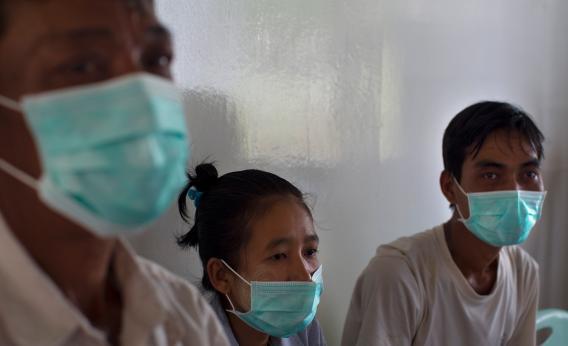In recent years, public health departments have been accused of overhyping threats—like with 2009’s swine flu (aka H1N1) and bird flu. But now a Florida county is being raked over the coals for allegedly concealing a tuberculosis outbreak.
According to a report issued in April, but largely overlooked until an article by Stacey Singer was published in the Palm Beach Press on Sunday, Florida’s Duval County has been fighting a cluster of TB cases—99, to be exact—that can be traced back to a single patient, a schizophrenic man diagnosed with a specific genotype of TB in 2008.
Florida officials had thought that the outbreak was contained, but recent spikes in cases prompted them to call the CDC for assistance earlier this year. While the center’s team was investigating what the report’s lead author would call “one of the most extensive TB outbreaks that [the] CDC has been invited to assist with since the early 1990s, both in terms of its size and rapid growth,” state officials were pushing to defund a TB hospital.
The problem may be with divergent definitions about what constitutes secrecy. At the heart of the debate is the fact that many of the outbreak patients had “[h]istories of homelessness, incarceration, and substance abuse,” according to the report.
As Singer explained in her Sunday story:
Believing the outbreak affected only their underclass, the health officials made a conscious decision not to not tell the public, repeating a decision they had made in 2008, when the same strain had appeared in an assisted living home for people with schizophrenia.
“What you don’t want is for anyone to have another reason why people should turn their backs on the homeless,” said Charles Griggs, the public information officer for the Duval County Health Department.”
After the Palm Beach Post broke the story on Sunday, officials in Florida said that Singer mischaracterized what happened and that subsequent to the CDC report, they worked with local hospitals, homeless shelters, and other interested parties. They just didn’t shout it from the rooftops—and they kept it quiet to protect this underserved population, not to neglect it. Another official told News Service Florida, “That population is very contained, they are not really mixing with the general population, so that’s why we have not felt the need to do widespread notification to the public,” according to a follow-up PBP piece. Furthermore, they emphasize, TB cases in Florida are actually declining.
While it is admirable to try to protect the homeless and mentally ill from further stigmatization, it seems that the TB spread beyond that cohort. Of the 99 identified patients, 60 were known to have been “homeless ever.” Seventeen of the 99 did not appear to have any of the social risk factors flagged by the CDC, like homelessness, incarceration, or tobacco smoking. Six were children, five of whom had identifiable connections to other cases. While the CDC was not able to interview all 99 patients—some had died, others were impossible to track down—it seems clear that some of those affected were not homeless.
Perhaps the officials’ motivation really was altruistic. But it’s also possible that large-scale awareness is particularly important in this case because the outbreak has particularly affected the disenfranchised. It is harder to reach them, making it difficult to get them to start treatment and to identify anyone to whom they may have spread the bacteria. They are also more likely to be noncompliant with the intensive TB treatment. That’s risky: Starting but not completing the required course of antibiotics cause a patient to develop drug-resistant TB. In the Florida outbreak, mercifully, just one patient appeared to develop single-drug resistant TB through noncompliance, according to the CDC’s accounting. Of course, you don’t have to be homeless to avoid TB treatment: Remember the 2007 case of a man diagnosed with drug-resistant tuberculosis who flew on an international flight and allegedly avoided health officials? (He later sued the CDC, claiming, among other things, that he was assured by doctors that he wasn’t putting other people at risk and that information about his health was released without his permission. His suit was dismissed several times, most recently in March of this year.)
Earlier this year, doctors in India warned that they had uncovered a “totally drug-resistant” strain. India denied the report. But cases of multiple-drug-resistant TB are nevertheless rising. Paul Nunn of the World Health Organization told the Guardian in May, “It occurs basically when the health system screws up.” That’s what officials are up against here.
